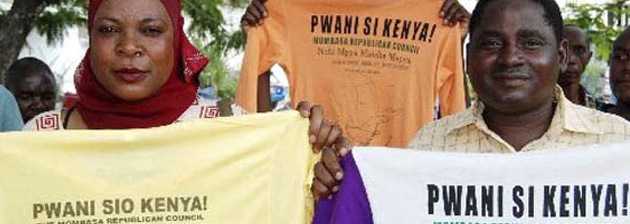The Kenyan media needs to clearly understand the historical reasons fuelling insecurity at the Kenyan coast.
At a Free and Fair Media workshop for television journalists held in Mombasa in late April 2012, it emerged that the call for secession of the Kenyan Coastal Strip by the separatist group, the Mombasa Republican Council (MRC), is gradually becoming a security headache and a key determinant to the next general election.
The saying ‘they should be given a hearing’ has become a popular maxim among several leaders eyeing various electoral positions come the elections.
Addressing journalists at the media training workshop on elections and security, businessman Suleiman Shabhal, an aspirant for the Mombasa County governorship, emphasized the need for dialogue between the government and the secessionist leaders. ‘The most civilized method of reaching an amicable solution to any disagreement is dialogue’, he said.
Shabhal’s call came just a day before President Kibaki declared the MRC an illegal group, while Prime Minister Raila Odinga ruled out any chance of the government tolerating the MRC. It is unclear what actual methods the government intends to engage in dealing with the group.
Speaking to journalists at the same workshop, the Coast Province Provincial Police Officer, Mr. Aggrey Adoli appealed to the MRC to respect the Law in their quest to have their grievances addressed. He gave assurance that the government was on high alert and that any government programs would not be interfered with by any group including the MRC. ‘We are ready to deal with any security threats. The MRC mission is just a very big dream. It cannot interfere with government work in any way’, he said.
Mr. Adoli’s assurance is much needed, being that the MRC has threatened to disrupt elections as a method of perpetuating their course. But, even in their combative course, they have enjoyed growing sympathy among the local population. ‘They should be given a hearing. It is unwise to dismiss them and brand them as criminals even before we hear them out’, said Ms. Suraiya Hirsi, a Maendeleo ya Wanawake official at the Coast.
What is not widely known is that the MRC issue traces its origin to the time when Arab conquerors arrived at the East African Coast only to be displaced by the Portuguese who institutionalized slavery on the local population.
Pained by the human rights abuses and the disruptions to their cultural order, the local population, led by a group of Mjikenda elders sent a delegation to the Sultan of Oman in 1661. They requested the Sultan for military assistance against the Portuguese. He agreed but on condition that he was paid.
The Sultan did send an army and the Portuguese were defeated but the elders did not pay what they promised prompting the sultan to occupy the ten mile coastal strip from Vanga in South Coast all the way to the Lamu archipelago. This occupation continued until the advent of colonialism when the British paid off the Sultan and signed an agreement to conquer the strip – which was not originally part of the Kenya colony – until the year 2013 when the MRC claim, the strip will cease to be part of Kenya.
In addition to the History, the MRC is motivated in their quest for secession by years of marginalization. ‘Marginalization of the coastal people since independence is by design and not by default’, said Philip Mbaji, a researcher who specializes on MRC discourse. He claims that land allocation and employment at the coast has always been skewed to favour ‘outsiders’. It is in recognition of this unfairness that the coastal people have thought it better to secede hoping that it is the perfect solution to marginalization.
He’s however quick to challenge the media on what role they can constructively play in this conflict. Mbaji said the media should desist from focusing on insignificant factors, like how many demonstrations and court cases the MRC was dealing with, but should instead provide critical analysis on the immediate and underlying causes of the problem, the options of addressing it, the cost of secession, and the likelihood of success for this movement.
Indeed, crucial information regarding this secession issue has been absent from the mainstream media, like the fact that the Constitution addresses marginalization effectively, making secession crusades almost unnecessary.
MRC officials led by their Secretary General, Mr. Randu Nzai Rua have maintained that outlawing the movement is not justified. ‘Only criminal groups ought to be banned. We have not engaged in any criminal activity. We are not violent and we have not stolen from anybody. We are only expressing our feelings; which is our democratic right’, he told the Mombasa workshop.
Mr. Rua argued that the media had misrepresented most of their issues ignoring the critical historical injustices that the coastal people have faced for decades.




